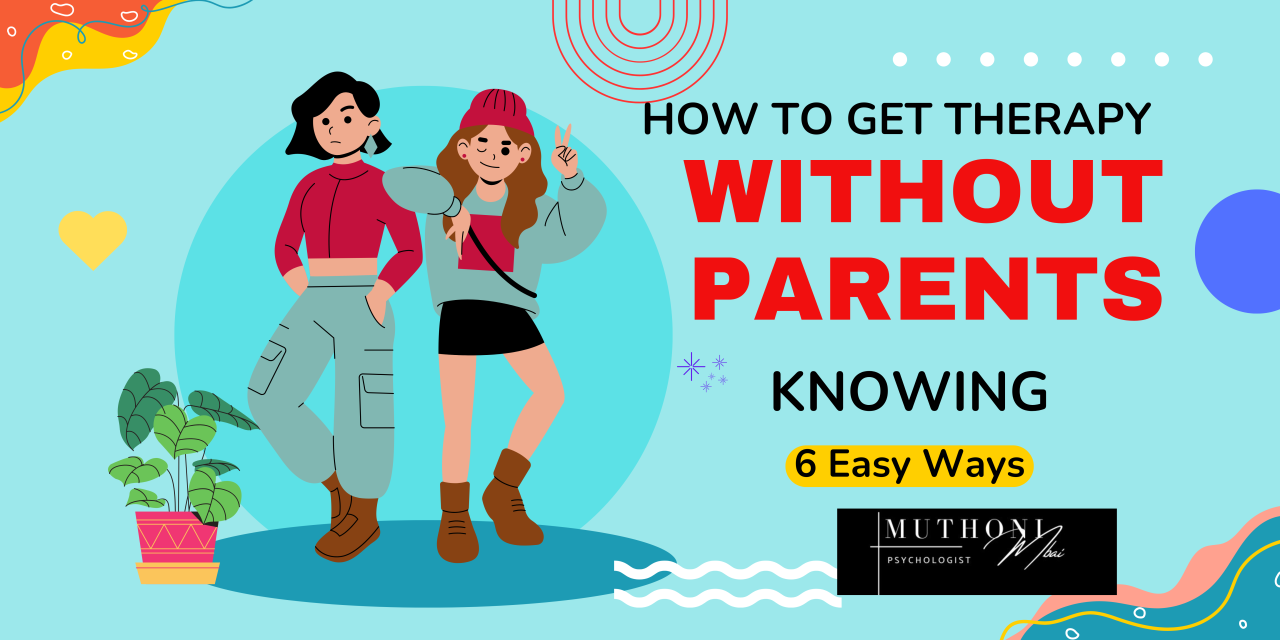
How to Get Therapy Without Parents Knowing – 6 Easy Ways

You need therapy. You feel the issue at hand is so confidential that you don’t want your parents to know. You feel stuck. Fortunately, there’s something you can do.
Seeking therapy can be a life-changing step toward improving your mental health, but for some, the challenge isn’t just about finding the right therapist—it’s also about doing so without certain people, like parents, knowing.
Whether you’re a teenager or young adult living at home, understanding how to get therapy without parents knowing is crucial. There are ways to access therapy discreetly while respecting your privacy.
How to Get Therapy Without Parents Knowing
If you’re trying to keep your therapy sessions private, here are actionable steps you can take:
- Use Online Therapy Platforms: Platforms like Therapyke.com allow you to connect with licensed therapists virtually. You can chat, video call, or email your therapist from the privacy of your device.
- Seek Free or Low-Cost Services: Many schools, colleges, and community centers offer counseling services free of charge or at reduced rates. These services are often confidential.
- Pay with Your Own Funds: To keep financial privacy, avoid using shared insurance or accounts. If you don’t have personal funds, consider using cash or prepaid debit cards.
- Use Confidential Communication: Choose a private email or phone number to book sessions and communicate with your therapist. Ensure notifications on shared devices are turned off.
- Time Your Sessions Strategically: Schedule therapy sessions during times when you’re expected to be elsewhere, like at school, work, or a friend’s house. This minimizes questions about your whereabouts.
- Look for Peer Counseling: Peer support groups, both online and in-person, can offer a bridge to professional help. Some organizations provide anonymous chats with trained listeners.
For more tips on finding affordable options, check out our article on How to Get Therapy When You Can’t Afford It.
What to Do When You Don’t Want to Go to Therapy?
Sometimes, even when therapy is accessible, the idea of opening up to a stranger can feel overwhelming. If you’re reluctant to seek therapy:
- Explore Self-Help Resources: Start with books, podcasts, or apps like Calm which can guide you through mindfulness and emotional management techniques.
- Talk to Someone You Trust: A close friend, teacher, or mentor can provide emotional support and help you take the next step.
- Start Small: Commit to just one session and evaluate how you feel afterward. Often, the first session can alleviate fears.
- Journal Your Feelings: Writing about your emotions can be a therapeutic exercise in itself and help clarify whether professional help is needed.
Related articles:
How to Fix Mental Health Without Therapy – 6 Proven ways
How to Fix a Relationship Without Therapy
Should I Tell My Parents I’m Going to Therapy?
The decision to inform your parents about therapy is deeply personal and depends on your relationship with them. Consider the following:
- Weigh the Pros and Cons: Sharing with supportive parents can provide emotional and financial support. However, if your parents are unlikely to understand, keeping it private may be best.
- Test the Waters: Bring up mental health in a general conversation to gauge their attitudes.
- Have a Prepared Response: If you choose to tell them, explain your reasons calmly and focus on the positive impact therapy will have on your life.
- Seek Guidance: A trusted adult or school counselor might offer advice on how to navigate this conversation.
How to Get Someone Help with Mental Health Issues?
Helping someone who’s struggling with their mental health can be challenging, especially if they’re resistant to seeking help. Here’s how you can assist:
- Be Supportive, Not Pushy: Let them know you’re there to listen without judgment.
- Share Resources: Provide them with information about therapy options, including online platforms they can access privately.
- Encourage Small Steps: Suggest starting with a mental health hotline or a free support group to ease into the idea of professional help.
- Respect Their Autonomy: Ultimately, the decision to seek therapy has to come from them. Your role is to encourage, not to pressure.
What Does a Therapist Do?
Understanding what a therapist does can demystify the process and make it less intimidating:
- Provides a Safe Space: Therapists offer a confidential and non-judgmental environment to express your thoughts and feelings.
- Guides Problem-Solving: They help you identify patterns, understand emotions, and develop coping strategies.
- Uses Evidence-Based Techniques: Therapists draw on approaches like Cognitive Behavioral Therapy (CBT) or Eye Movement Desensitization and Reprocessing (EMDR) to address specific issues.
- Supports Personal Growth: Therapy isn’t just for crises. It’s also a tool for self-improvement and achieving personal goals.
Accessing therapy without parental knowledge is possible, but it requires planning and resourcefulness. Whether you’re navigating privacy concerns, exploring alternative resources, or helping someone else, there are solutions to every hurdle. Remember, taking that first step toward mental health support is a courageous and vital move.
If you’re looking for more advice or want to schedule a session, talk to us at our Contact Page. We’re here to support you, no matter your circumstances.



